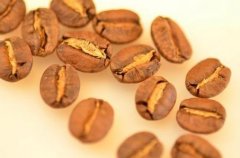General knowledge of Fine Coffee in Brazilian Coffee Coffee and Bean producing countries

Although Brazil produces 30% to 35% of the world's coffee annually, ranking first in the world, none of the Brazilian beans can be called the top coffee. The mountains are full of coffee trees in southern Brazil, but Santos is the only one that can be brought to the table. Most of the other hastily processed beans are used to make instant coffee and easy-to-open coffee. Santos Coffee is a descendant of Arabica trees from Island of Bourbon (today's French island of Reunion, located in the Indian Ocean east of Madagascar) in the 18th century and belongs to the var subspecies. Bourbon). Before the age of three to four, Bubang coffee trees bear small, twisted beans called "Bubon Santos", the most advanced Brazilian beans, often referred to directly as "Brazil" in cafes.
After the age of three or four, Bubang coffee trees will only produce large, flat beans, called "Flat Bean Santos", which are cheap and unpopular with coffee people. Bubang Santos does not have a prominent personality, plain taste, medium texture, ordinary sour taste, usually used as the base of mixed coffee, specially set off other coffee. One feature, however, is that it is rich in oil, which is a welcome advantage for those who do not like to mix Espresso complex products with robusta beans-it guarantees you a thick Krima.
Brazil also has a "Rio" bean, which is also famous for its origin in Rio de Janeiro, but it is not because it tastes good, but because it tastes strange. It has a strong smell of iodine, which coffee experts particularly call "Rio"; another dishonorable word related to Rio beans is used to describe a somewhat irritating taste, called "Rioy," caused by coffee berries dried on trees that continue to ferment during drying and are often found in dried Rio beans.
Important Notice :
前街咖啡 FrontStreet Coffee has moved to new addredd:
FrontStreet Coffee Address: 315,Donghua East Road,GuangZhou
Tel:020 38364473
- Prev

Coffee bean producing country Venezuelan origin coffee
Venezuela's coffee production is not high, most of it for domestic consumption. Although the main origin of Venezuelan coffee comes from the western region close to Colombia, its sour taste is very weak, not like Colombian beans at all, but as sweet and deep as Caribbean beans.
- Next

Coffee bean producing countries of Jamaica origin
When it comes to Jamaica, we immediately think of "Blue Mountain" coffee. Rare and expensive true blue mountain beans, originally from the Wallensford Coffee Garden, have now been expanded to the Blue Mountains with an altitude of more than 1000 meters. As long as the tree species and treatment procedures of the manor meet certain standards, the government will issue a guarantee to allow the use of the name "Blue Mountain".
Related
- Guji coffee producing area of Guji, Ethiopia: Humbela, Shakiso, Wulaga
- What is the most expensive variety of Qiloso in BOP multi-variety group?
- How to store the coffee beans bought home?
- Why are Yemeni coffee beans so rare now?
- Ethiopian Sidamo all Red Fruit Sun Sun Santa Vini Coffee beans
- SOE is mostly sour? What does it mean? Is it a single bean? what's the difference between it and Italian blending?
- Is Italian coffee beans suitable for making hand-brewed coffee?
- How to choose coffee beans when making cold coffee? What kind of coffee beans are suitable for making cold coffee?
- Just entered the pit to make coffee, what kind of coffee beans should be chosen?
- Can only Japan buy real Blue Mountain Coffee? What are authentic Jamaican Blue Mountain coffee beans?

